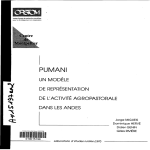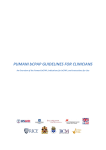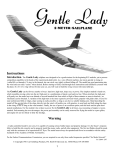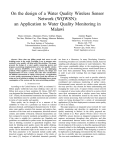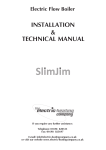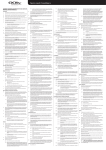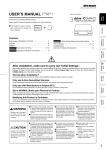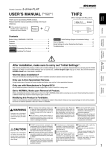Download 1. Turn on the Pumani CPAP. - Rice 360˚ Institute for Global health
Transcript
Pumani CPAP User Manual Introduction Respiratory failure is a leading cause of neonatal mortality in the developing world. Bubble continuous positive airway pressure (bCPAP) is a safe, effective intervention for infants with respiratory distress and is widely used in developed countries. The Pumani bCPAP is a low-cost, easy-to-use, easy-to-repair device to treat infants in respiratory distress, and it has been designed specifically to operate in lowresource settings. Clinical results show that use of the Pumani bCPAP can significantly reduce neonatal mortality in low-resource settings. The Pumani bCPAP has been developed at the Rice 360⁰: Institute for Global Health Technologies at Rice University in Houston, TX, in partnership with Queen Elizabeth Central Hospital and the College of Medicine in Blantyre, Malawi; the Malawi Ministry of Health; Baylor College of Medicine and Texas Children’s Hospital in Houston, TX; and 3rd Stone Design in San Rafael, CA. Table of Contents Part I: How to Assemble the Pumani CPAP Pumani CPAP Components Assembly Instructions Part II: How to Prepare the Baby for CPAP Part III: How to Attach the Baby to the Pumani CPAP Prong & Hat Components Attachment Instructions Part IV: How to Monitor the Baby Part V: Disinfection Instructions Part VI: Troubleshooting Pumani CPAP Troubleshooting Prong Troubleshooting Part VII: Pumani CPAP Repair Instructions Appendix A: Setting the Flows for a Specific Percent O2 4 5 6-16 17 20 21 22-27 28 32 34 35 36 37 48 Part I: How to Assemble the Pumani CPAP 4 Pumani CPAP Components 1. Patient Tubing Port 2. Bottle Tubing Port 3. Oxygen Flow Meter 4. Blended Flow Meter 5. Bottle Strap 6. Bottle and Lid 7. Oxygen Port 8. Power Switch 9. Patient Tubing 10. Elbow Connector 11. Nasal Prongs 12. Bottle Tubing 13. Power Cord 5 9 Step 1: Filling and Connecting the Bottle 1. Fill bottle with water and attach the lid to the bottle. • 6 Most patients start at 6 cm of water pressure. 2. Place bottle into bottle strap and connect the bottle tubing to the bottle and to the Pumani CPAP machine. Step 2: Connecting the Patient Tubing Connect the patient tubing to the Pumani CPAP at the patient tubing port. 7 Step 3: Determining Prong Size 1. Use the patient’s weight as a guide to choose the prong size. 2. The prong size is located between the nasal prongs. – You can use the prong size guide on the next page to determine the prong size. 8 Step 4: Prong Size Guide Place the nasal prongs on the pictures to determine the prong size. 9 Step 5: Checking Prong Size 1. Check the prong size by placing the prongs in the patient’s nose. • The prongs should be placed curved-side down, as shown. • The prongs should completely fill each nostril. • Immediately remove the prongs. 10 2. If the nostrils are not completely filled, air will leak and the patient will not get the necessary pressure. You will need to replace the prongs with the next largest prong size. Step 6: Connecting the Prongs Straight Connector 1. Connect the elbow connector to one side of the prongs. 11 2. Connect the other side of the prongs to the patient tubing. Step 7: Checking the Pumani CPAP Assembly Make sure all of the CPAP components are properly assembled: 1. 2. 3. 4. 12 Patient Tubing Bottle Tubing Bottle and Lid Prongs Step 8: Turning the Pumani CPAP On 1. Connect the power cord to the back of the Pumani CPAP and to an electrical outlet. 13 2. Turn on the Pumani CPAP power switch. A red light should be lit when the Pumani CPAP is on. Step 9: Attaching the Oxygen Concentrator If the patient needs oxygen: 1. Open the oxygen flow meter on the Pumani CPAP. 2. Attach tubing from the oxygen concentrator to the O2 port. Make sure the oxygen concentrator is turned on. 1. 14 2. If the patient does not need oxygen: - Do not connect the oxygen concentrator. - Close the oxygen flow meter. Step 10: Determining Oxygen Flow and Blended Flow Most patients will start at the same settings: Concentrator Flow Neonate 3 L/min Child 4 L/min 1 Set the concentrator Oxygen Flow 3 L/min 4 L/min 2 then the oxygen flow 15 *For a larger range of flow options, see Appendix A. Blended Flow 6 L/min 6 L/min 3 then the blended flow Step 11: Checking the Bubbling Function 16 1. Cover the prongs. Water in the bottle should bubble. 2. Remove fingers from prongs. Bubbling should stop. 3. If the bubbling does not start or stop, refer to the Pumani CPAP troubleshooting (page 35). 4. Turn the Pumani CPAP off and continue to Part II: How to Prepare the Baby for CPAP. Part II: How to Prepare the Baby for CPAP 17 Step 1: Suctioning the Nose & Mouth 1. Measure from the nose to the ear and halfway back to determine suction depth of the nose. • For example: if the distance is 6 cm, the depth should be 9 cm (6+3 = 9). 2. Briefly remove the O2 tube from the nose. Put a drop of saline in one nostril, insert the tube to the determined depth, then cover the suction port as you pull out the suction tube. 3. Repeat in the other nostril. 4. Place the O2 tube back into the nose. 5. Suction the mouth. 18 Step 2: Inserting the OG Tube 1. 2. 3. 4. 19 Measure from the mouth to the ear, and then to the bottom of the sternum. Make note of the measurement. Insert the OG tube in the mouth to this depth. Check that the OG tube is in the stomach by placing the end of the tubing in water. If it does not bubble, it is in the correct place. (You can also aspirate the OG tube with a syringe to check for stomach contents.) 5. Tape the OG tube to the chin. 6. Note: if the abdomen is distended, consider aspirating the tube with a syringe. Part III: How to Attach the Baby to the Pumani CPAP 20 Prongs & Hat Components These are the items you need to attach the prongs to the baby: 21 Step 1: Making the Hat 22 Hat Size Stockinette Length Stockinette Width Small 61 cm (24 in) 2 inch Medium 66 cm (26 in) 3 inch Large 71 cm (28 in) 4 inch 1. Select hat size based on size of the patient’s head. 2. Measure length and cut stockinette. 3. Twist stockinette in the middle. 4. Pull one half of the stockinette over the other half. 5. Fold bottom edge 3 times to make a 5-cm brim. Step 2: Placing the Hat on the Patient 1. Place hat on the patient. • Make sure that the hat fits tightly to prevent the prongs from moving. • The back of the hat should be low, near the baby’s neck. • Hat may need to be replaced at least every 24 hours to keep a tight fit on the baby’s head. 23 Step 3: Inserting the Prongs 1. 2. 3. 4. Turn on the Pumani CPAP. Make sure the flows are still set correctly. Add saline drops in the nose. Place the prongs into the nose. • There should be a ¼ cm space between the prongs and the nose. • Do not use creams or ointments, as these can cause breakdown of the tissue and block the prongs. 24 Step 4: Attaching the Safety Pins 1. Hold the prongs on the hat (you can mark on the hat where the pins should be placed). Make sure the prongs stay in the nose. 2. Important: place fingers under the brim of the hat to maintain space between the hat and the head when placing the safety pins. 3. Insert two safety pins through each side of the hat. 25 • Keep the sharp end of the pin away from the patient’s face. • Do not put the pins all the way through to the baby’s head. • The pins should never be in contact with the patient. Step 5: Attaching the Prongs 1. Hold the tubing between the pins. 2. Wrap the elastic over one pin, across the tubing, and over the other pin. 3. Wrap the other elastic over the 2 pins on the other side of the hat. 26 Step 6: Check the Prongs This is how the prongs should appear once they are attached: Hat Patient Tubing Safety Pins Elastic ¼ cm space between the prongs and the nose Prongs 27 Part IV: How to Monitor the Baby 28 Checking the Respiratory Rate 1. Once the patient is settled on the Pumani CPAP, the respiratory rate should be measured. 2. To measure the respiratory rate: • Uncover the patient’s abdomen so you can view the chest. • Press the respiratory rate timer to start the 60-second count. • As soon as you press the timer, begin counting the patient’s breaths. • The timer will beep once after 30 seconds – do not stop counting. When the timer beeps twice, stop counting. • Record the respiratory rate. 29 Checking the Oxygen Saturation 1. Once the patient is settled on the Pumani CPAP, the oxygen saturation should be checked with a pulse oximeter. 2. Place the pulse ox probe on the patient. • For smaller babies, wrap the probe around the palm of the baby’s hand • For larger babies, place the finger probe on the patient’s finger 3. Turn the pulse oximeter on. 4. Watch the waveform for 1-2 minutes until it looks constant. Good Waveform: Bad Waveform: 30 5. Record the oxygen saturation and heart rate. 6. If the oxygen saturation is <90%, increase the oxygen flow rate by 1 L/min. Patient Monitoring Checklist 31 What to Check For Response Is the power on? If the power is NOT on: ─ Remove the prongs immediately ─ Place the patient on oxygen ─ If possible, take the Pumani CPAP to a ward with power ─ Document how long the patient was off CPAP and how long the patient was on oxygen Are the nostrils moist? If the patient’s nostrils are not moist: ─ Place saline drops in the patient’s nostrils Are the prongs in the patient’s nose? If the prongs are not in the patient’s nose: ─ Re-insert the prongs into the patient’s nose ─ You may need to reposition the hat, pins, or elastics to keep the prongs in place Is the hat tight on the patient’s head? If the hat is not tight on the patient’s head: ─ Remove the hat and replace the hat with a new hat Part V: Disinfection Instructions 32 Instructions for Disinfection After each use: 1. Place patient on 2 L of oxygen, turn off the Pumani CPAP, and place elastics and pins in the storage cabinet. 2. Throw away the hat and OG tube. 3. Disconnect bottle tubing, patient tubing, prongs, and bottle. 4. Throw away the water in the bottle. 5. Soak the bottle tubing, patient tubing, prongs, bottle, and lid in a 0.5% bleach solution for 10 minutes (or follow your hospital’s standard disinfection procedures). Bleaching time should not exceed one hour. 6. Rinse all bleached components under clean water, hang tubing to dry, and leave bottle and prongs out to dry. 7. Clean oxygen concentrator filter (on the back of the concentrator) by removing debris and thoroughly rinsing under water. 33 Part VI: Troubleshooting 34 Pumani CPAP Troubleshooting Problem The Pumani CPAP does not turn on. Water does not bubble when I cover the prongs with my fingers. Water bubbles when the prongs are uncovered. There is no O2 flow. 35 Possible Cause Solution The Pumani CPAP does not have power. Check to see that the Pumani CPAP is plugged in and that the outlet is switched on. The switch is not in the “on” position. Turn switch to “on” position. A red light should be lit when the Pumani CPAP is on. The bottle tubing and patient tubing are not correctly connected. Correctly connect tubing. Connectors should snap into place. The blended flow is not high enough. Slightly increase the blended flow until the water starts to bubble. The bottle tubing or patient tubing is pinched or blocked. Check for and resolve any pinches or blocks. The blended flow is too high. Slightly decrease the blended flow until the water stops bubbling. The oxygen tubing is improperly connected. Fix concentrator tubing connections. The concentrator is improperly connected. Make sure the concentrator is plugged in, turned on, and the nozzle is completely attached. Prong Troubleshooting Problem Possible Cause Water does not The prongs are too small. bubble when the The prongs are positioned incorrectly. prongs are placed in the Air is leaking out of the mouth. airway. The prongs do not stay in the nose. The patient does not tolerate the prongs. 36 Solution Replace the prongs with a larger size. Reposition the prongs. Gently close the baby’s mouth for a few moments to encourage nose breathing. The prongs are too small. Replace the prongs with a larger size. The hat is stretched out or too large. Replace the hat with a new or smaller hat. The pins are improperly aligned. Realign the pins. The tubing on the hat is improperly positioned. Reposition the tubing on the hat. The prongs are too small or are pinching on the patient’s septum. Replace the prongs with a larger size. The prongs are pushing up against the septum. Increase space between the prongs and the septum. Consider replacing the prongs with a larger size. The patient has not settled. After the prongs are placed, wait for the patient to settle. This may take a few minutes. Part VII: Pumani CPAP Repair Instructions 37 Opening the Pumani CPAP Unscrew and remove the 6 screws around the top of the CPAP using an Allen wrench. Remove the bottle tube. Pull the lid of the CPAP away from the machine. 38 Spare Kit Bag Contents The Spare Kit Bag, found on the back left wall of the Pumani CPAP, contains: 1. 2. 3. 4. 5. 6. 7. 8. 39 Spare kit bag Two packages of diaphragm sets (4 diaphragms total) One small black zip tie One white zip tie Bottle tubing Two screws Two bottle tubing connectors Pumani Unit Service Log Pump Troubleshooting 1. With the lid removed, reattach the bottle tubing. Turn on the Pumani CPAP and set the flow as close to 10 L/min as possible. 2. Inside of the Pumani CPAP, check that the tubing is attached to all pump outlets and that the outlets are intact (not broken). • If the tubing is not attached, reattach it. • If the tubing and the white connector have come off the pump, reglue the connector to the pump outlet. • If the pump outlet has broken off, replace the pump. 3. Pinch the tubing to block air flow from each of the two pumps, one at a time. • If the flow decreases by half when the flow from one pump is blocked, the blocked pump is operating properly. • If the flow does not change when the flow from one pump is blocked, the pump is broken. Go to Repair Step 1. 40 Tubing correctly attached to the pump outlet. Pump Repair Step 1 Unscrew and remove the 4 screws surrounding the pumps using a Phillips head screwdriver. 41 You should have 4 tubes, 4 screws, and 4 washers. Pump Repair Step 2 Turn the pump upside down. Unscrew the 4 screws on the bottom of the pump using a flathead screwdriver. 42 Pump Repair Step 3 Separate the mounting bracket from the pump base. 43 Pump Repair Step 4 Separate the pump base from the pump housing. 44 Pump Repair Step 5 Once the pump is open, check the following: What to check for Response Apply glue under the Is the center screw screw head, and tighten loose? the center screw. Are the diaphragms damaged? Are the gaskets loose or broken? 45 Inspect the diaphragms, and replace any diaphragms which appear broken or worn. If gasket is loose, push the gasket back into the hole. If the leg holding the gasket breaks, replace the pump. Pump Repair Step 6 To replace a broken diaphragm, remove the nut securing the broken diaphragm to the lever arm and rotate the lever arm away from the diaphragm. 46 Do NOT remove the center screw. Pump Repair Step 7 Record work done: Remove the broken diaphragm and replace it with a new diaphragm. Record all work done in the Pumani Unit Service Log (in the spare parts kit) and on the maintenance label on the back of the machine. 47 To reassemble the pump, repeat steps 1-6 in reverse order. Appendix A: Setting the Flows for a Specific Percent Oxygen Delivered to Patient 1. Find the column with the chosen blended flow rate to deliver to the patient, known as the Blended Flow Rate (L/min). 2. Find the row with the chosen Percent Oxygen Delivered to Patient (%). 3. The table value where the chosen column and row meet is your Oxygen Flow Rate (L/min). An Example Setting is shown in the table to the right: A patient requires a Blended Flow Rate of 8 L/min and an Oxygen Concentration of 50%. Therefore, an Oxygen Flow Rate of 3.5 L/min should be delivered to the patient. 48 Oxygen Flow Rate (L/min) Percent Oxygen Delivered to Patient (%) 5 6 7 8 9 10 40% 1.5 1.5 2 2.5 2.5 3 50% 2 2.5 3 3.5 3.5 4.5 60% 2.5 3 4 4.5 5 5.5 Oxygen Flow Rate (L/min) Percent Oxygen Delivered to Patient (%) Blended Flow Rate (L/min) Blended Flow Rate (L/min) 5 6 7 8 9 10 40% 1.5 1.5 2 2.5 2.5 3 50% 2 2.5 3 3.5 3.5 4.5 60% 2.5 3 4 4.5 5 5.5 For questions concerning the Pumani bCPAP Clinical Evaluation and Implementation in Malawi: For questions concerning the Pumani bCPAP Development as part of the Rice 360⁰: Institute for Global Health Technologies: For questions concerning the Pumani bCPAP Design and Manufacture in partnership with 3rd Stone Design: College of Medicine, University of Malawi Rice 360⁰: Institute for Global Health Technologies 3rd Stone Design, LLC Private Bag 360 Blantyre 3 Malawi 6500 Main St., MS636 30 Castro Ave San Rafael, CA 94901 Houston, TX 77005 +1 (415) 454-3005 Clinical inquiries: contact local ARI coordinator or K. Kawaza 0992217282 Technical inquiries: Shannon O’Neill (+265 994174276) & MK Quinn (+265 996458336) +1 (713) 348-4549 [email protected] [email protected] www.3rdstonedesign.com www.rice360.rice.edu This manual is made possible through the generous support of the Saving Lives at Birth partners: the United States Agency for International Development (USAID), the Government of Norway, the Bill & Melinda Gates Foundation, Grand Challenges Canada, and UK Aid. It was prepared by William Marsh Rice University and does not necessarily reflect the views of the Saving Lives at Birth Partners. DCO 038 3-378 (Pumani CPAP User Manual) – Rev B

















































